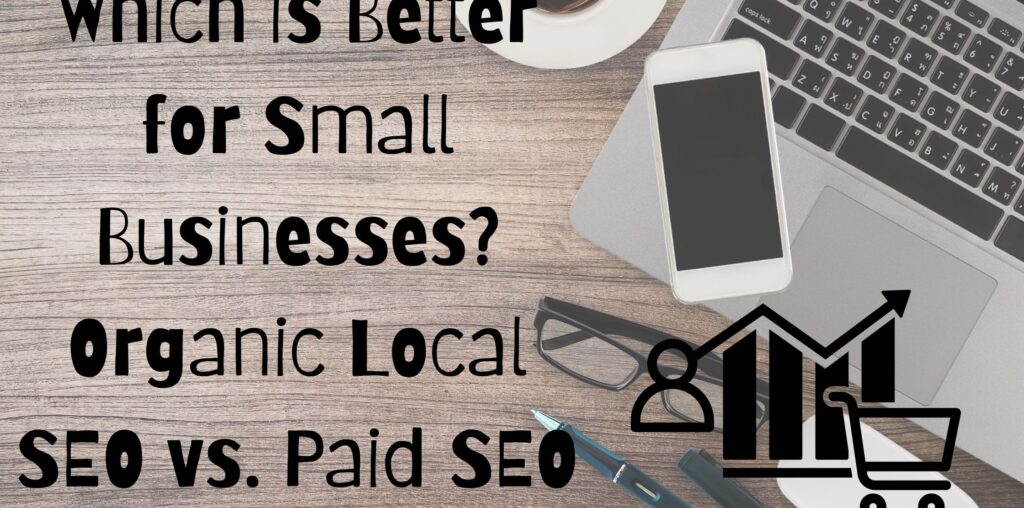In today’s competitive digital landscape, small businesses face a crucial decision: Should they invest in organic local SEO for long-term growth, or should they opt for paid SEO to gain instant visibility? The answer depends on several factors, including budget, business goals, and the urgency of results. Let’s take a deep dive into both strategies to determine which is best suited for small businesses.
Understanding Organic Local SEO vs. Paid SEO
Before choosing a strategy, it’s essential to understand what each entails and how they function.
What is Organic Local SEO?
Organic local SEO focuses on optimizing a website to rank higher in unpaid search results, particularly for location-based searches. It involves improving content, keyword strategy, and backlinks to achieve sustainable online visibility.
Key components include:
- Google My Business (GMB) Optimization – Keeping business information updated and verified.
- Local Keyword Optimization – Targeting relevant keywords tied to a specific location.
- Content Marketing – Producing valuable blogs, guides, and local news.
- Link Building – Acquiring high-quality backlinks from reputable sites.
- Customer Reviews – Encouraging satisfied clients to leave positive feedback online.
What is Paid SEO?
Paid SEO, or Pay-Per-Click (PPC), involves running paid advertising campaigns to ensure a business appears at the top of search engine results pages (SERPs). It provides immediate traffic but requires ongoing investment.
Common tactics include:
- Google Search Ads – Sponsored listings appearing above organic results.
- Display Ads – Banner ads placed across various websites.
- Social Media Ads – Paid promotions on Facebook, Instagram, and LinkedIn.
- Retargeting Ads – Engaging previous website visitors with targeted advertisements.
- Geo-Targeting – Running location-based ad campaigns to reach potential customers.
Now that we have a clear understanding, let’s compare the benefits and drawbacks of each approach.
Organic Local SEO: The Long-Term Growth Strategy
Pros of Organic Local SEO
- Cost-Effective – No ongoing ad spend is required; just strategic efforts in optimization.
- Credibility & Trust – Users tend to trust organic search results over paid ads.
- Sustainable Results – Rankings achieved through SEO can last long-term with proper maintenance.
- Higher Click-Through Rates (CTR) – Organic results generally attract more clicks than ads.
- Better Local Reach – Appearing in Google’s Local Pack can significantly increase visibility.
Cons of Organic Local SEO
- Time-Consuming – It takes months to see tangible results.
- Algorithm Changes – Google updates can impact rankings unpredictably.
- Competitive Landscape – Ranking in competitive industries requires constant effort.
Paid SEO: The Shortcut to Instant Visibility
Pros of Paid SEO
- Immediate Results – Ads generate instant visibility for your business.
- Highly Targeted Advertising – You can control demographics, location, and user interests.
- Measurable ROI – Platforms provide detailed analytics for performance tracking.
- Flexible Budgeting – You can scale campaigns based on business needs.
- Better for Promotions – Ideal for launching products or seasonal offers quickly.
Cons of Paid SEO
- Expensive – Competitive industries require a high ad budget.
- Temporary Traffic – Visibility vanishes once the ads stop.
- User Distrust – Many users skip ads in favor of organic results.
- Click Fraud Risks – Bots or competitors may click on ads, wasting the budget.
Organic vs. Paid SEO: What’s the Best Choice for Small Businesses?
The right approach depends on your business goals, budget, and how quickly you need results.
When to Choose Organic Local SEO
- If you want sustainable long-term growth.
- If you have a limited budget but can invest time into SEO efforts.
- If credibility and brand trust are your priorities.
- If your business relies on local traffic and customer reviews.
When to Choose Paid SEO
- If you need immediate results and traffic.
- If you are launching a new product or promotion.
- If your market is highly competitive, making organic ranking difficult.
- If you have the budget to invest in ongoing ad campaigns.
Why a Hybrid Approach Works Best
For most small businesses, combining both organic and paid SEO delivers the best results. Here’s how:
- Use Paid SEO for Quick Wins – PPC can drive immediate traffic while your organic strategy takes shape.
- Optimize for Local SEO – Keep your Google My Business listing accurate and optimize for local keywords.
- Create Quality Content – Consistently publish blogs, guides, and updates to boost organic rankings.
- Run Retargeting Ads – Convert visitors who didn’t take action the first time.
- Leverage Data Insights – Use analytics from paid campaigns to refine organic SEO strategies.
Conclusion:
There’s no universal answer—both organic local SEO and paid SEO have their strengths. The most effective strategy depends on your business’s unique needs.
For sustainable growth and credibility, organic SEO is essential. But for quick wins and immediate visibility, paid SEO is a powerful tool. Combining both ensures small businesses achieve steady online growth while maximizing short-term opportunities.
To navigate the complexities of digital marketing, working with an organic SEO agency can help streamline your strategy and drive better results.
FAQs
1. How long does it take to see results with organic local SEO?
It typically takes three to six months to see significant improvements in rankings and traffic. However, results vary depending on industry competition and SEO efforts.
2. Is paid SEO worth it for small businesses?
Yes, if used strategically. Paid SEO provides instant traffic and visibility, making it ideal for promotions, new launches, and competitive industries.
3. Can I do both organic and paid SEO together?
Absolutely! A hybrid approach allows businesses to gain immediate visibility while building long-term organic credibility.
4. How much should I budget for paid SEO?
The budget depends on competition, industry, and target audience. Small businesses typically start with $500–$2,000 per month for PPC campaigns.
5. Which SEO strategy is more cost-effective in the long run?
Organic SEO is more cost-effective over time since it provides sustainable traffic without continuous ad spend. However, it requires time and effort to maintain rankings.



